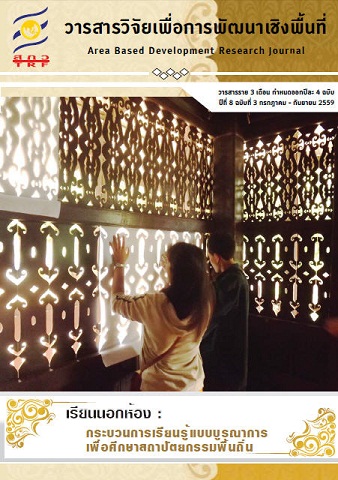เรียนนอกห้อง: กระบวนการเรียนรู้แบบบูรณาการเพื่อศึกษาสถาปัตยกรรมพื้นถิ่น
Main Article Content
Abstract
บทคัดย่อไม่สมบูรณ์
Learning outside the classroom: The Integrated learning process of vernacular architecture study
Vernacular architecture is a product of the cultural heritage which is suitable to be used as a base for learning of project; the integrated program of teaching, research, academic service and preservation of art and culture of program in architectural technology, Faculty of Industrial Technology, Buriram Rajabhat University. That were an integrated program of teaching and the mission of the university and for applying research methods to create mutual learning outside of classroom of university students group from different academic years and cooperative learning with the community. That new type of learning can help students gaining knowledge, and can propose the knowledge of conserving vernacular buildings and the proper use of the buildings. This learning process affected the students to engage in the learning process more than the old teaching method. The people in the community had the satisfaction of overall works and realized the importance of the vernacular architectures. Consequently, they were inspired to conserve the vernacular architectures in order to maintain its local identity through globalization.Article Details
Area Based Development Research Journal values copyright protection and licensing to safeguard author rights and facilitate the appropriate dissemination of research. Our policies ensure openness, accessibility, and attribution. Authors retain copyright ownership, and articles are published under a Creative Commons Attribution License (CC BY), allowing sharing, adaptation, and proper attribution. Authors have the freedom to publish under the CC BY license, granting broad reuse and distribution permissions. The journal supports posting articles on third-party repositories, adhering to institutional and funding restrictions. Author guidelines detail copyright and licensing requirements, empowering authors with knowledge about their rights and responsibilities. These policies cultivate an environment of collaboration, openness, and responsible sharing, benefiting authors and the research community while honoring intellectual property rights.


